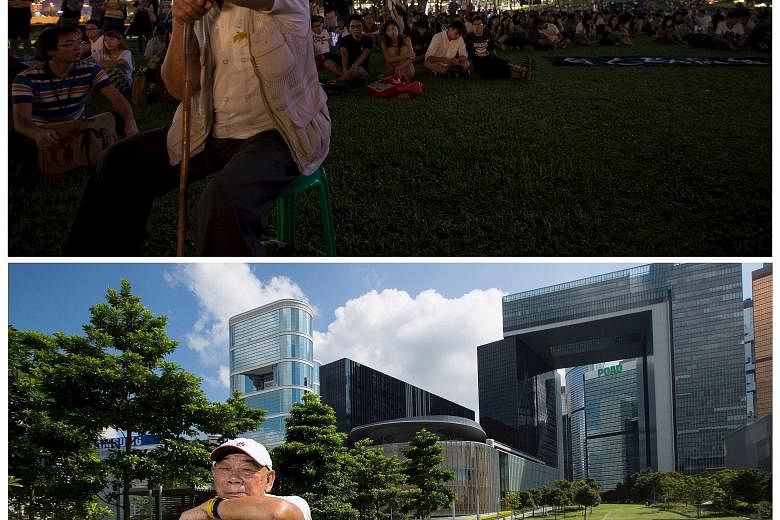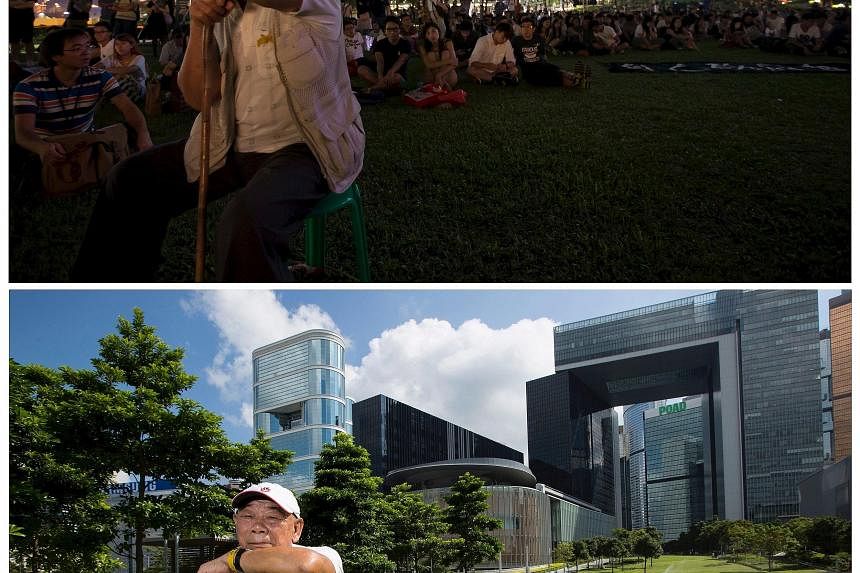The road glistens with freshly laid asphalt, the lamp posts scrubbed of adhesive marks. So far, so genteel.
The only thing that might strike the casual observer as odd is the "no climbing" signs tacked on the walls of Mong Kok's train station exits. After all, who would clamber up except, perhaps, spectators wanting a bird's eye view of the biggest protest in Hong Kong?
During the 79-day Occupy movement last autumn, the urbanscape of Mong Kok saw the most frenetic action.
If Admiralty on Hong Kong Island - where the sit-in was first triggered and where its leaders gathered to confer - was the brains of the protest movement, Mong Kok, on the Kowloon side, was its pulsating, erratic heart. The third sit-in site, at the tourist hub of Causeway Bay, was perhaps its charming face, with intricately decorated tents.
It was at Mong Kok where the most violent clashes erupted, between protesters and police; between protesters and anti-protest supporters, some said to have been hired by triads active in the district.
Mong Kok also had the most colourful protest scene, boasting, among other things, a Christian chapel, where believers gathered to discuss the scriptures, and a Taoist shrine to Guan Yu, a warrior deified for his righteousness and courage.
One year on, it is - almost - business as usual. Heavy traffic has reconquered Nathan Road. The gold, diamonds and jade in multiple jewellery stores, many from the same chains, sing out their siren song to passers-by. Tourists from mainland China continue to ply the pavements, their accents and suitcases marking them out.
Together, they represent the myriad issues that contributed to the Occupy protesters' anger: Powerful business interests; a feeling among the youth that they don't have the same opportunities as previous generations, with high rentals blocking their way; and an inchoate desperation that their city is no longer their own.
Yet, some things have changed in the past 365 days.
For one thing, there are now fewer tourists from mainland China.
Mr Oscar Chan, 28, who owns part of a pharmacy next to the Mong Kok train station, struggles to keep his voice down as he says: "The whole world knew that we quarrelled with China, that Hong Kong is chaotic."
He claims that business now is worse than in 2003, when Sars struck the city.
Guangzhou tourist Li Yongshi, 26, shopping with her family, says that some of her friends now avoid Hong Kong. "They're scared of being scolded."
Mr So Chiu, 65, who sells Hong Kong-made embroidered slippers in a sliver of a shop in Nathan Road, says that his business is down, too, but attributes it to the souring Chinese economy.
Over at Admiralty, Hong Kong's political hub that is home to the government's headquarters, the legislative council and a People's Liberation Army garrison, there is also little evidence remaining of the massive demonstration a year ago.
On Sept 28 last year, a Sunday, tens of thousands of people were trying to join up with others protesting in front of the government complex. Irate at the police barricades blocking them, they swarmed across Harcourt Road, forcing vehicles to beat a retreat.
The police use of pepper spray and later tear gas propelled yet more to pour onto the streets across the city in a show of solidarity.
But for much of the past year, it was more or less quiet. A clutch of abandoned chairs in front of the government complex are all that remains of the "Tamar Village" - diehard protesters who stayed on for months after Occupy disbanded.
With the movement having failed to achieve its goals of forcing Beijing to give way on allowing Hong Kongers more say on electing their Chief Executive, Occupy is now just a fading memory for the bulk of Hong Kong society, cynical about what can be done to change the political landscape.
University students Wincy Wu, 21, and Geoffrey Tang, 21, shopping at Causeway Bay, were lost for words when asked about what it meant to them and for Hong Kong.
Says Ms Wu eventually: "We don't really discuss it now, it's too ridiculous. When it comes up in a conversation, our friends will say, 'Don't talk about it,' because the discussion will eventually just reach the same dead end - which is that, really, there is nothing we can do about it."



